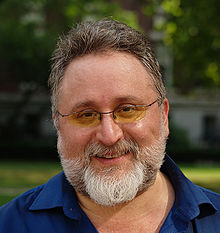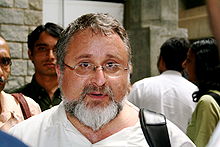- Eben Moglen
-
Eben Moglen 
Born July 13, 1959 Occupation Professor of Law and Legal history at Columbia University, Director-Counsel and Chairman, Software Freedom Law Center Website http://emoglen.law.columbia.edu Eben Moglen is a professor of law and legal history at Columbia University, and is the founder, Director-Counsel and Chairman of Software Freedom Law Center, whose client list includes numerous pro bono clients, such as the Free Software Foundation.
Contents
Professional biography
Moglen started out as a computer programming language designer[1] and then received his bachelor's degree from Swarthmore College in 1980, where he won the Hicks Prize for Literary Criticism. In 1985, he received a Master of Philosophy in history and a JD from Yale University. He has held visiting appointments at Harvard University, Tel Aviv University and the University of Virginia since 1987.
He was a law clerk to Justice Thurgood Marshall (1986–87 term). He joined the faculty of Columbia Law School in 1987, and was admitted to the New York bar in 1988.[2] He received a Ph.D. in history from Yale University in 1993. Moglen serves as a director of the Public Patent Foundation.
Moglen was part of Philip Zimmermann's defense team, when Zimmermann was being investigated over the export of Pretty Good Privacy, a public key encryption system, under US export laws.[3]
In 2003 he received the EFF Pioneer Award. In February 2005, he founded the Software Freedom Law Center.
Moglen is closely involved with the Free Software Foundation, serving as general counsel since 1994 and board member from 2000 to 2007. As counsel, Moglen was charged with enforcing the GNU General Public License (GPL) on behalf of the FSF,[4] and later became heavily involved with drafting version 3 of the GPL. On April 23, 2007 he announced in a blog post that he would be stepping down from the board of directors of the Free Software Foundation. Moglen stated that after the GPLv3 Discussion Draft 3 had been released, he wanted to devote more time to writing, teaching, and the Software Freedom Law Center.[5]
Freedom Box Foundation
In February 2011, Moglen created the Freedom Box Foundation to design software for a very small server called the Freedom Box. The Freedom Box is an affordable personal server which runs all free software, and makes communications spy resistant.[6] The foundation’s purpose is to raise funds for the creation and expansion of software for the Freedom Box. Moglen hopes for upwards of $500,000 to be able to launch Freedom Box officially within a year. [7]
Stances on free software
Moglen says that free software is a fundamental requirement for a democratic and free society in which we are surrounded by and dependent upon technical devices. Only if controlling these devices is open to all via free software, can we balance power equally.[8]
Moglen's Metaphorical Corollary to Faraday's Law is the idea that the information appearance and flow between the human minds connected via the Internet works like induction. Hence Moglen's phrase "Resist the resistance!" (i.e. remove anything that inhibits the flow of information).[9]
Statements and perspectives
 Moglen at GPL V3 conference in Bangalore, 2006
Moglen at GPL V3 conference in Bangalore, 2006
While speaking in New Delhi, India, in 2006, he remarked: "Anything that is worth copying is worth sharing." His other quotes: "The more we give away, the richer we become." And: "Note how even the smallest encounter with Free Software can make a man cheerful about the future of our judge" (said after hearing a judge of the Allahabad high court, India speak on the subject).[citation needed]
Moglen believes the idea of proprietary software is as ludicrous as having "proprietary mathematics" or "proprietary geometry". This would convert the subjects from "something you can learn" into "something you must buy", he has argued. He points out that software is among the "things which can be copied infinitely over and over again, without any further costs".
Moglen has criticized what he calls the "reification of selfishness". He has said, "A world full of computers which you can't understand, can't fix and can't use (because it is controlled by inaccessible proprietary software) is a world controlled by machines."
He has called on lawyers to help the Free Software movement, saying: "Those who want to share their code can make products and share their work without additional legal risks." He urged his legal colleagues, "It's worth giving up a little in order to produce a sounder ecology for all. Think kindly about the idea of sharing."
Moglen sketches the history of copyright law as a form of industrial regulation, and analyses how the changes in technology have thrown the roles created by those laws into crisis. As part of an interview for Steal This Film in April 2007
Moglen has criticized trends which result in "excluding people from knowledge". On the issue of Free Software versus proprietary software, he has argued that "much has been said by the few who stand to lose". Moglen calls for a "sensible respect for both the creators and users" of software code. In general, this concept is a part of what Moglen has termed a "revolution" against the privileged owners of media, distribution channels, and software. On March 13, 2009, in a speech given at Seattle University, Moglen said of the free software movement that, "'When everybody owns the press, then freedom of the press belongs to everybody' seems to be the inevitable inference, and that’s where we are moving, and when the publishers get used to that, they’ll become us, and we’ll become them, and the first amendment will mean: 'Congress shall make no law […] abridging freedom of speech, or of the press […].', not – as they have tended to argue in the course of the 20th century – 'Congress shall make no law infringing the sacred right of the Sulzbergers to be different.'.".[10]
On the subject of Digital Rights Management, Moglen once said, "We also live in a world in which the right to tinker is under some very substantial threat. This is said to be because movie and record companies must eat. I will concede that they must eat. Though, like me, they should eat less."[11]
References
- ^ FLOSS Weekly with Chris DiBona, episode 13
- ^ NY State Bar Association record.
- ^ Moody, Glyn (March 30, 2006). "A lawyer who is also idealist - how refreshing". The Guardian (London). http://technology.guardian.co.uk/weekly/story/0,,1742104,00.html. Retrieved May 1, 2010.
- ^ Enforcing the GNU GPL — GNU Project — Free Software Foundation (FSF)
- ^ Freedom Now
- ^ Decentralizing the Internet So Big Brother Can’t Find You
- ^ The Freedom Box: Make technology that supports freedom. Turn freedom on!
- ^ http://www.youtube.com/watch?v=QOEMv0S8AcA
- ^ Freeing The Mind: Free Software and the Death of Proprietary Culture
- ^ Free and Open Software: Paradigm for a New Intellectual Commons
- ^ Keynote speech at Red Hat Summit 2006
External links
more links can be found on wikisource
- Eben Moglen's webpage at Columbia University
- ‘A lawyer who is also idealist - how refreshing’, March 30, 2006 interview in The Guardian.
Lectures / papers
- Why Political Liberty Depends on Software Freedom More Than Ever, transcript of keynote speech at the 2011 FOSDEM conference in Brussels on Feb 5, 2011
- Freedom in the cloud: Software Freedom, Privacy, and Security for Web 2.0 and Cloud Computing, transcript of speech given to the Internet Society's New York branch on Feb 5, 2010
- Anarchism Triumphant: Free Software and the Death of Copyright - August 1999 PDF
- The dotCommunist Manifesto: Video of talk at UNC-Chapel Hill, Howard W. Odum Institute, 51 min, November 1, 2001
- The Future of the Net ISOC-NY talk (May 2002) (audio)
- The dotCommunist Manifesto - January 2003 PDF
- Opening keynote at Wizards of OS3, Berlin, June 10, 2004, 57 min
- Video, 20 MiB and 131 MiB MPEG videos
- Audio, 64 kbit/s 26 MiB, 96 kbit/s 39 MiB MP3, and 88 kbit/s 36 MiB Ogg Vorbis formats
- Text version, 42 KiB HTML, also available in PDF and PostScript formats
- Free Software and Free Media ISOC-NY talk (May 2006) (video / audio)
- Framing the Debate: Free Expression versus Intellectual Property, the Next Fifty Years paper (February 2007)
- Patent Law at a Crossroads: Bilski and Beyond Cardozo School of Law, NYC (Nov 2 2009) (video/audio)
- Freedom in the Cloud: Software Freedom, Privacy and Security for Web 2.0 and Cloud Computing ISOC-NY Talk (Feb 5 2010) (video/audio)
- Making History: Israeli Law and Historical Reconstruction, (2000)
- Freeing the Mind: Free Software and the Death of Proprietary Culture (2003)
- So Much for Savages:Navajo 1, Government 0 in Final Moments of Play (1999)
Key figures in the history of free software Rick Adams · Eric Allman · Brian Behlendorf · Keith Bostic · Alan Cox · Matthias Ettrich · Miguel de Icaza · Theo de Raadt · Jim Gettys · John Gilmore · Jon "maddog" Hall · Jordan Hubbard · Lynne and William Jolitz · Rasmus Lerdorf · Lawrence Lessig · Yukihiro Matsumoto · Marshall Kirk McKusick · Eben Moglen · Ian Murdock · Tim O'Reilly · Keith Packard · Brian Paul · Bruce Perens · Eric S. Raymond · Bob Scheifler · Mark Shuttleworth · Richard Stallman · Linus Torvalds · Theodore Ts'o · Andrew Tridgell · Guido van Rossum · Paul Vixie · Larry WallGNU Project History 
Licenses Software Public speakers - Alexandre Oliva
- Benjamin Mako Hill
- Bradley M. Kuhn
- Eben Moglen
- Federico Heinz
- Georg C. F. Greve
- Loïc Dachary
- Ricardo Galli
- Richard Stallman
- Robert J. Chassell
- John Sullivan
Other topics Categories:- Law clerks of the Supreme Court of the United States
- Members of the Free Software Foundation board of directors
- American legal scholars
- GNU people
- Columbia University faculty
- Yale Law School alumni
- Swarthmore College alumni
- Harvard University staff
- University of Virginia faculty
- Copyright scholars
- Copyright activists
- American lawyers
- American bloggers
- Living people
- Columbia Law School faculty
- 1959 births
Wikimedia Foundation. 2010.
